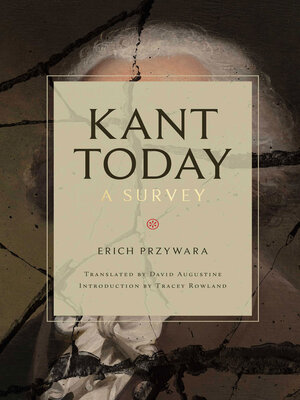
Sign up to save your library
With an OverDrive account, you can save your favorite libraries for at-a-glance information about availability. Find out more about OverDrive accounts.
Find this title in Libby, the library reading app by OverDrive.



Search for a digital library with this title
Title found at these libraries:
| Library Name | Distance |
|---|---|
| Loading... |
In Kant Today: A Survey, Erich Przywara explores the enduring impact of the tensions inherent in Immanuel Kant's thought on continental philosophy over nearly a century and a half. Drawing parallels to the efforts at synthesis of Thomas Aquinas, Przywara presents Kant as a thinker striving to reconcile disparate currents of contemporary thought. While Aquinas fused neo-Platonic Augustinian philosophy with the neo-Aristotelianism of the Parisian Arts Faculty, Kant sought to harmonize continental idealism with the skepticism and empiricism exemplified by a British thinker like David Hume.
Aquinas's synthesis maintained coherence due to his reliance on the analogia entis. In contrast, Kant's synthesis lacked such a unifying principle, leading to the proliferation of philosophical antitheses reverberating throughout nineteenth- and early-twentieth-century Europe. Kant Today chronicles the aftermath of Kant's tumultuous synthesis and suggests that the resolution may lie in a thinker capable of uniting Augustine's fervent pursuit of God with Aquinas's distinctive epistemological equilibrium—namely, John Henry Newman.
Aquinas's synthesis maintained coherence due to his reliance on the analogia entis. In contrast, Kant's synthesis lacked such a unifying principle, leading to the proliferation of philosophical antitheses reverberating throughout nineteenth- and early-twentieth-century Europe. Kant Today chronicles the aftermath of Kant's tumultuous synthesis and suggests that the resolution may lie in a thinker capable of uniting Augustine's fervent pursuit of God with Aquinas's distinctive epistemological equilibrium—namely, John Henry Newman.







